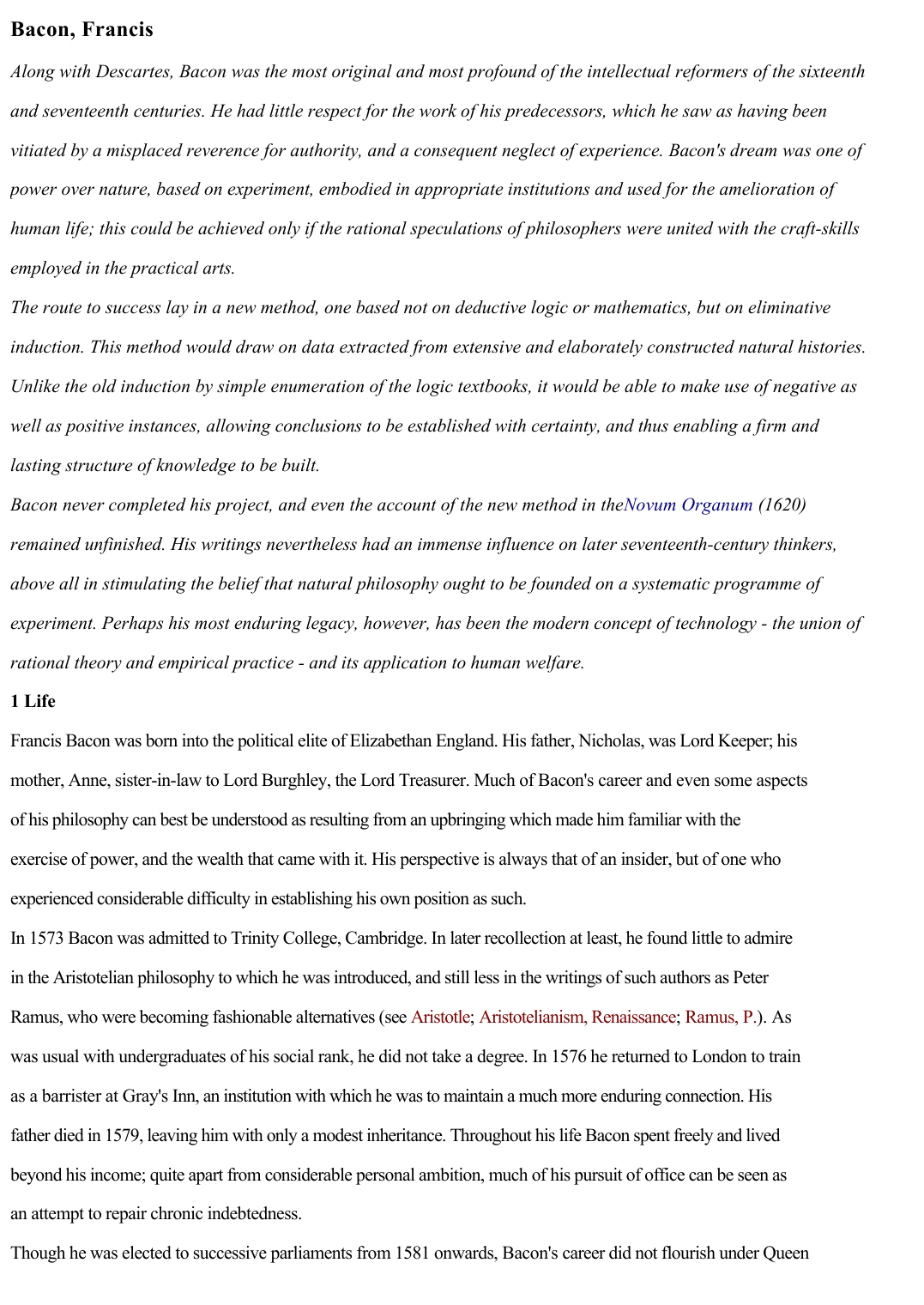Bacon, Francis
Publié le 16/05/2020

Extrait du document
«
Bacon, Francis
Along with Descartes, Bacon was the most original and most profound of the intellectual reformers of the sixteenth
and seventeenth centuries.
He had little respect for the work of his predecessors, which he saw as having been
vitiated by a misplaced reverence for authority, and a consequent neglect of experience.
Bacon's dream was one of
power over nature, based on experiment, embodied in appropriate institutions and used for the amelioration of
human life; this could be achieved only if the rational speculations of philosophers were united with the craft-skills
employed in the practical arts.
The route to success lay in a new method, one based not on deductive logic or mathematics, but on eliminative
induction.
This method would draw on data extracted from extensive and elaborately constructed natural histories.
Unlike the old induction by simple enumeration of the logic textbooks, it would be able to make use of negative as
well as positive instances, allowing conclusions to be established with certainty, and thus enabling a firm and
lasting structure of knowledge to be built.
Bacon never completed his project, and even the account of the new method in the Novum Organum (1620)
remained unfinished.
His writings nevertheless had an immense influence on later seventeenth-century thinkers,
above all in stimulating the belief that natural philosophy ought to be founded on a systematic programme of
experiment.
Perhaps his most enduring legacy, however, has been the modern concept of technology - the union of
rational theory and empirical practice - and its application to human welfare.
1 Life
Francis Bacon was born into the political elite of Elizabethan England.
His father, Nicholas, was Lord Keeper; his
mother, Anne, sister-in-law to Lord Burghley, the Lord Treasurer.
Much of Bacon's career and even some aspects
of his philosophy can best be understood as resulting from an upbringing which made him familiar with the
exercise of power, and the wealth that came with it.
His perspective is always that of an insider, but of one who
experienced considerable difficulty in establishing his own position as such.
In 1573 Bacon was admitted to Trinity College, Cambridge.
In later recollection at least, he found little to admire
in the Aristotelian philosophy to which he was introduced, and still less in the writings of such authors as Peter
Ramus, who were becoming fashionable alternatives (see Aristotle ; Aristotelianism, Renaissance ; Ramus, P. ).
As
was usual with undergraduates of his social rank, he did not take a degree.
In 1576 he returned to London to train
as a barrister at Gray's Inn, an institution with which he was to maintain a much more enduring connection.
His
father died in 1579, leaving him with only a modest inheritance.
Throughout his life Bacon spent freely and lived
beyond his income; quite apart from considerable personal ambition, much of his pursuit of office can be seen as
an attempt to repair chronic indebtedness.
Though he was elected to successive parliaments from 1581 onwards, Bacon's career did not flourish under Queen.
»
↓↓↓ APERÇU DU DOCUMENT ↓↓↓
Liens utiles
- Bacon Francis
- Francis Bacon par André Lalandede l'Institut de France C'est une figure assez
- Francis Bacon par Denis MilhauConservateur du Musée des Augustins à Toulouse Une vision qui traque les modèles avec la plus torturante indiscrétion et quiassaille les spectateurs dans leur sensibilité, fait de Bacon un peintre d'uneindéniable originalité.
- Francis Bacon Descendant du philosophe élisabéthain du même nom, Francis Baconnaquit à Dublin.
- Francis Bacon (Vie, ¼uvre, Apports, Concepts, Commentaires).


